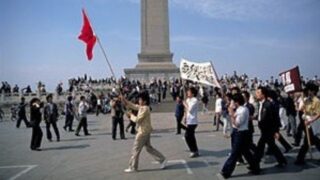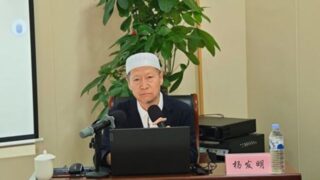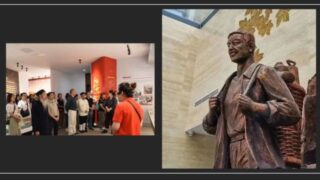The strange story of a controversial religious movement accused of having turned an independently minded performer into a CCP fan.
by Gladys Kwok


The story that most impressed Hong Kong young people this month of July is about pop singer Eman Lam, also known under her Chinese name of Lin Erwen. The 40-year old performer had a certain anti-establishment aura. She never supported pro-democracy protests but became popular for denouncing the discrimination and shaming of those who, like her, are overweight, and had formed a beloved musical duo called “at17” with vocal LGBT activist Ellen Joyce Loo (Chinese name Lu Kaitong) before the latter committed suicide in 2018.
July 1, 2022, was the 25th anniversary of Britain’s handover of Hong Kong to China. Even President Xi Jinping came to Hong Kong to celebrate. Eman Lam released on July 1 a new song, “Ode to China,” whose style is different from her previous production. The message is clearly political and pro-CCP. She uploaded the song on social media and reactions by the fans were overwhelmingly negative. Not all the fans have strong political feelings but clearly they find Lam’s turn to propaganda disappointing and unpalatable.
What puzzled them was also the fact that the singer had thanked “Master Xuan Ming” for the new orientation of her career. In fact, in recent concerts Lam had asked her “fellow Taoist practitioners” to come on stage and sing with her.


Some of Lam’s disappointed fans started researching the religious organization the singer is affiliated with, Master Xuan Ming’s Xuanwu Temple of Wealth. Some posted essays on social media calling the organization a xie jiao or a “cult.” Master Xuan Ming, whose real name may be Lai Jinqiang, founded a religious movement in Taiwan promising wealth and happiness as a result of a set of devotional practices worshiping the Supreme Wealth God Xuanwu, then moved it to Hong Kong.
After Lam’s “Ode to China” was released, angry fans continued to research the Xuanwu Temple of Wealth and posted evidence of the luxurious lifestyle of its master. Falun-Gong-associate The Epoch Times also published an analysis of the Temple’s texts and beliefs, and concluded they are a potpourri of classic Chinese texts, often plagiarized without indicating them as source, by a spiritual master who had received only a primary education.


Lam, who has served as a volunteer for the Temple, defended the movement. The Temple itself answered critics by pointing out its charitable activities. The organization is visible enough, seems to promise miraculous results to those who practice its rituals, and followers donate to the master significant money. It would seem that the Xuanwu Temple of Wealth is in a good position to be exposed by the CCP as a typical xie jiao or a cult.


This has not happened, however, perhaps for a reason. By reading the social media posts of the Temple, it comes out that in October 2019 Master Xuan Ming led his followers, including Lam, in a trip to Shaanxi in Mainland China to “recover the roots.” Master and followers, including the singer, visited a temple of the god Xuanwu in Xi’an, decorates with banners celebrating the 70th anniversary of the foundation of the People’s Republic of China and the “Chinese dream.”


The story of Eman Lam indicates the possibility that the Xuanwu Temple of Wealth is used by the CCP for “patriotic” propaganda in Hong Kong, which causes the CCP to gloss over its master’s peccadilloes. It may look similar to groups exposed as xie jiao, but because of its usefulness the CCP does not denounce it—although Eman Lam’s irate fans now do.











